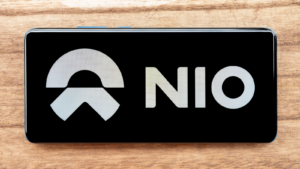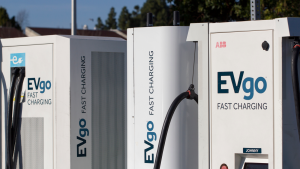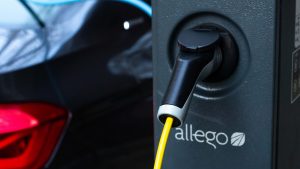These three stocks will grow in the gap between the exponential increase in EV production and the charging options available. All of them have partnerships with major automotive companies, have the best of the best charging technology and are in a position to capitalize on the growing demand.
We’ll detail each stock’s prospects in products and services, the partnerships and the statistics that make them the best EV charging stocks to buy in April.
Nio (NIO)

Nio (NYSE:NIO) is one of the hottest EV producers in China. The company’s most recent Q4 report showed a considerable delivery increase and a promising revenue boost. However, Nio’s appeal does not stop there.
The company has recently announced some exciting developments in its technology and product offerings. Nio is not limited to EV production and offers some of the most advanced and accessible charging technology for its vehicles in China.
In December of last year, Nio announced the deployment of its new Power Charger 4.0 and PowerSwap Station 4.0, which will start in April of this year. The deployment includes 1,000 more Power Swap Stations and 20,000 chargers added to its extensive network.
To further its expansion efforts, Nio has also announced its plan to release an EV model catered to the mass market (family) consumer. Following its release in May, this new model has the potential to bring in some impressive sales and further growth for Nio this year.
EVgo (EVGO)

EVgo (NASDAQ:EVGO) owns and operates one of the most established charging networks throughout the U.S. The stock has been popular within the EV charging market but recently has garnered attention for its enticing valuation following a price drop this year.
While price drops certainly raise eyebrows in most cases, EVgo is not dropping due to a lack of performance. Last quarter, the company performed exceptionally and had estimates for this year that gave investors good reason to give it the attention it’s due.
In addition to the undervaluation and solid financials, EVgo has partnered with some of the biggest brands. EVgo has deals with some of the world’s largest EV producers, such as Toyota (NYSE:TM) and Honda (NYSE:HMC), to allow newer EV models to utilize the EVgo charging network.
With additions to the already expansive network, which ended last year with double the network utilization from 2022, and partnerships with automotive giants, EVgo’s low valuation presents investors with a golden opportunity for excellent returns this year.
Allego N.V. (ALLG)

Allego N.V. (NYSE:ALLG) is a Netherlands-based provider of EV charging services. Primarily serving other businesses, Allego N.V. has a diverse charging network of over 34,000 chargers serving EVs throughout Europe.
Allego N.V. is capitalizing on the growing EV market in Europe, and it has had some significant deals with large companies looking to utilize its charging technology. First is an agreement with the automotive giant Ford (NYSE:F).
The company’s deal with Ford promises that its dealerships throughout Europe will be equipped with Allego’s chargers and that network access will be provided to Ford EV customers. In addition, Ford will be adapting Allego’s charging technology in its rollout of the BlueOval Charge Network, promising over 600,000 charging points starting this year.
Venturing outside of just automotive companies, Allego is diversifying the availability of its chargers with a partnership with Burger King France. The deal promises Allego’s charging technology will be spread to locations throughout the country, adding to the company’s already prominent charging presence in France.
The stock has seen ups and downs but is coming back big this year, and investors should pay attention.
On the date of publication, Joel Lim did not hold (either directly or indirectly) any positions in the securities mentioned in this article. The opinions expressed in this article are those of the writer, subject to the InvestorPlace.com Publishing Guidelines.
Joel Lim is a finance freelance writer who writes content for several companies like LTSE and Realtor, along with financial publications, including Mises Institute and Foundation for Economic Education.
